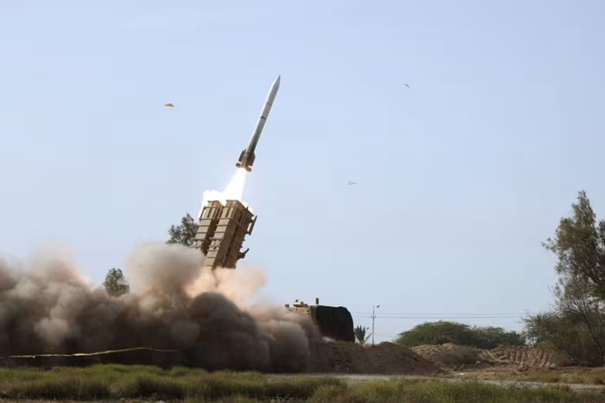Academy SITREP – Iran Sends Ballistic Missiles to Russia

What has Happened:
- Iran recently sent short-range ballistic missiles to Russia for use in its war in Ukraine following a deal that was in the works for over a year.
- The Fath-360 is a satellite-guided ballistic missile with a range of 75 miles and is carried by a truck.
- Secretary Blinken said that this move represents a “dramatic escalation” and would allow Russia to use these missiles against closer-range targets, thereby freeing up other weapons systems for strikes farther away from the front lines in Ukraine.
- As a result, the U.S. and key EU allies (Britain, France, and Germany) have announced new sanctions on entities including Iran’s main airline.
- Confirmation that Iran is now supplying Russia with sophisticated short-range ballistic missiles will likely increase pressure on the Biden administration (and some EU countries) to ease restrictions on certain weapons supplied to Ukraine.
- Zelensky has requested that the limits on longer-range weapons (such as the U.S. ATACMS and the U.K. Storm Shadow cruise missile) be taken away, which would allow Ukraine to strike military targets deeper inside Russia.
- Even though Ukraine has captured hundreds of square miles of territory inside of Russia around Kursk, Russia has commenced a counteroffensive, and the Russian advance on the strategically important city of Pokrovsk has been accelerating.
- Capturing Pokrovsk would allow Russian forces to sever a critical supply line that supports Ukraine’s front line troops and advance further into Donetsk (and even threaten Ukrainian positions in southeastern Ukraine).
Why it Matters:
“Given the scale of strikes and attrition by waves of Iranian drones employed by the Russians against Ukraine’s civilian infrastructure, it is no mystery why they continue to ‘double-down’ on a terror strategy that flies in the face of any military ethics. With the collapse/expiration of the missile sanctions regime against Iran, an expansion of Iranian technology exports naturally flows from drones to missiles. The West lost its leverage to slow/halt these exports, and now Ukrainians will pay the price. Tactically, these close-range ballistic missiles might be just what the Russians need to mass a fires campaign against the small pockets of Ukrainian forces that occupy Kursk. The Russians probably recognize their inability to conduct a maneuver campaign against the Ukrainian lodgment, and will likely turn to a fires campaign (even on their own soil). The Shahed UAV was one of the first systems highlighted in this war, but there has been long-running military technology cooperation between the Iranians and Russians. The Russians have generally held the upper hand in this exchange, but now that might be changing. Increasingly, the Iranians may be the relevant military technology source and the Russians are the logical recipient. In any case, while Iran gains sanctions-busting support from Russia, what it might covet most is continued flow of advanced Russian aircraft, aircraft parts, space cooperation, and similar technologies beyond Iranian native capabilities. Looks like this might be the catalyst for lifting some of the long-range missile restrictions the U.S. and U.K. have imposed to date. This could be hugely significant if this opens the door to increased numbers of Ukrainian missiles being fired into Russian launch points and airfields.” – General Michael Groen
“Clearly more missiles is better, and range allows more ‘protected’ launches and a wider range of target opportunities in Ukraine. I don’t believe sanctions will have any impact on Iran’s support of Russia’s war efforts. The Russians appear recently to be countering Ukraine’s Kursk incursion, but it remains to be seen whether it will be enough of a reprioritization to slow their offensive into the Donetsk. Cutting the supply line is key to Russian future success in this area, which Putin has affirmed as his priority. He will want this done to secure his negotiating position post-U.S. elections. I believe Russia will push hard to secure as much success in the Donetsk region as possible, as the fighting season and U.S. elections put a timeline on operations. The Ukrainians remain challenged to keep a strong defense and sustain their offensive in the Kursk region. If the Russians cut the supply line, the Ukrainian forces will have to look at their priority of effort. A potential negotiated settlement will keep both sides fighting to gain advantage in the event of a ceasefire.” – General Frank Kearney
“Secretary of State Blinken said that the decision by Iran to supply ballistic missiles to Russia is a ‘dramatic escalation’ in Putin’s war on Ukraine. The Russians are making another escalatory move with the Iranian ballistic missiles. The U.S. and the European supporters of Ukraine have been hesitant to take any steps that might escalate the war. Their major concern has been in allowing Ukraine to use the long-range weapons that they are supplying them with to attack deeper into Russia. This step by the Iranians seems to have crossed a red line and the U.S., the United Kingdom, France, and Germany are now consulting with each other on whether to provide Ukraine the approval to do what President Zelensky has been asking for. Zelensky has been arguing that the U.S. and Europeans are tying his hands, while Russia destroys Ukraine’s infrastructure and war-making industrial production capabilities. The Iranian-Russian deal probably goes farther than just helping Putin’s war effort and includes support for Iran’s nuclear weapons development. This is a wake-up call for the U.S. and Europe that Russia, Iran, North Korea, and China are all in this together to defeat Ukraine and diminish the support given to them by the West.” – General Robert Walsh


